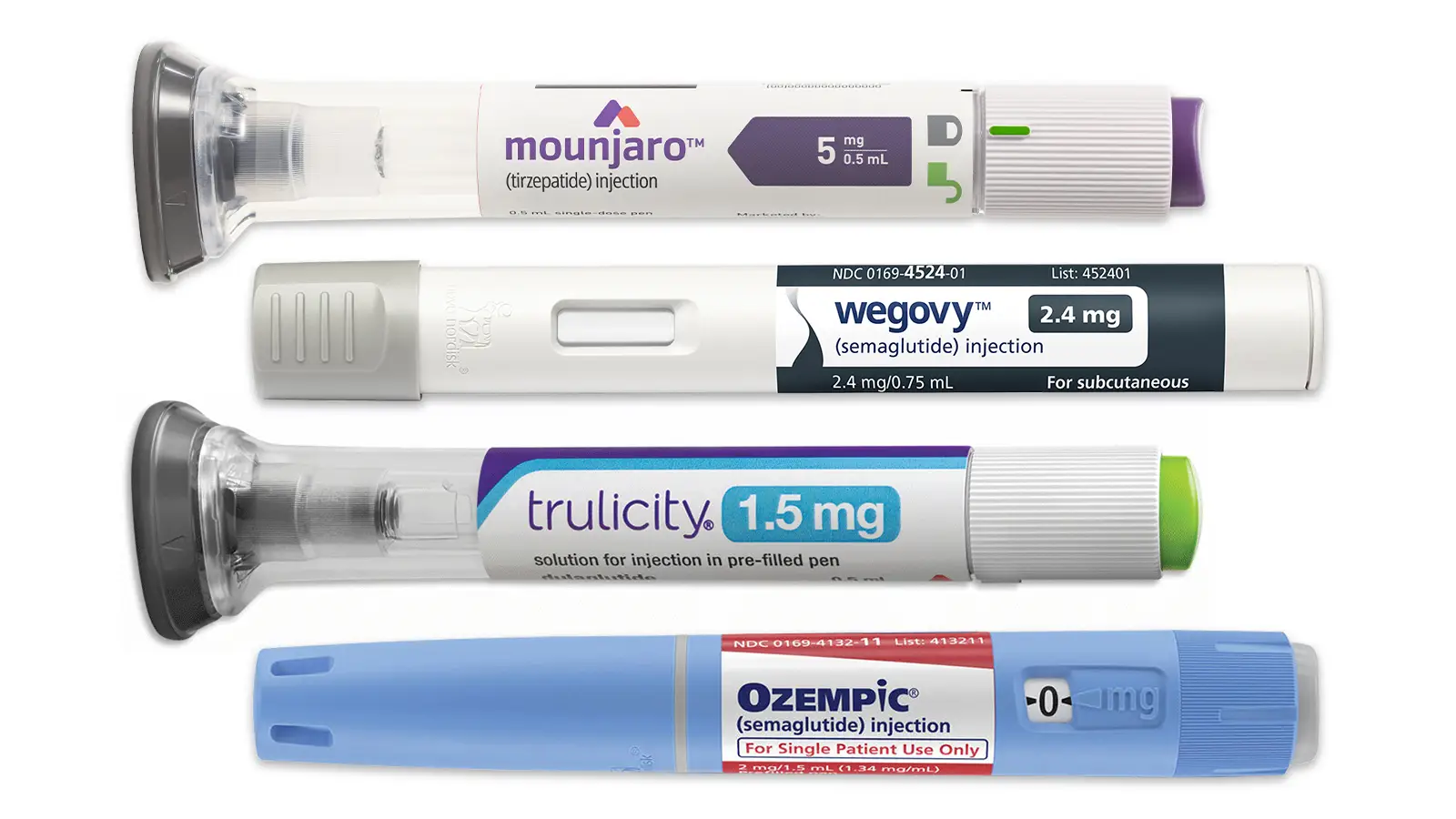Benefits Open Enrollment Planning: Employers Assess Coverage of Popular Weight Loss Drugs
June 4, 2024
While for most US organizations, Benefits Open Enrollment for their employees occurs in the Fall, the details, coverages, and costs of benefits are being brokered now. Open enrollment season is just a few short months away, and employers should be having renewal discussions with their benefits broker or agent in the June and July window, and increasingly those conversations will include how to handle the increasingly popular group of diabetes and weight-loss medications like Ozempic, Wegovy, Zepbound and Mounjaro.
These popular obesity drugs, called GLP-1 agonists, can cost roughly $1,000 per month on average — and they are typically taken for a long time to maintain their effectiveness. While there have been some reports of drug shortages of GLP-1 medications in 2023, it appears now that access to these weight-loss drugs is improving, with drug makers are ramping up production. Additionally, use cases continue to increase, with clinical trials showing benefits for conditions from sleep apnea to risk of heart disease. But many of the estimated 100 million American adults who are obese can’t afford to pay out of pocket for drugs like Novo Nordisk’s Wegovy and Eli Lilly’s Zepbound, and are turning to their employers, and their sponsored medical plans for help managing both access and cost.
With the surge in popularity of these drugs, more companies are increasing access to these weight-loss drugs for employees, but size of employer may make a big difference in securing employee access and affordability. Small businesses may not be willing or able to take on the full costs of coverage like larger organizations who are mostly self-insured or manage the increased premiums that likely accompany increased access to GLP-1s via their current health plans.
This matters because small businesses employ roughly half of the workers in the U.S. labor market, and they have been adding jobs at a faster pace than large employers. Since early 2021, small business hiring accounted for 53% of the 12.2 million total net jobs created across all employers, according to the U.S. Bureau of Labor Statistics, consistent with the longer-term labor market trends.
Analysis of coverage of GLP-1s by employer-sponsored plans reveals a mixed bag. An October 2023 survey of 205 companies by the International Foundation of Employee Benefit Plans found that 76% of respondents provided GLP-1 drug coverage when prescribed for diabetes, versus only 27% that provided coverage if the medications were prescribed purely for weight loss. The survey also reported that 13% of plan sponsors indicated they were considering coverage for weight loss, most likely for the next plan year. Covering these drugs, however, is harder for smaller employers, many of whom rely on off-the-shelf plans offered by their insurance carriers. While there are plans that cover GLP-1 drugs, the cost can be prohibitive for many small businesses.
Large employers too, have at times struggled to justify the increased costs to their plans of these drugs, given their popularity and the length of time, essentially forever, patients need to take them in order to achieve the desired weight-loss results. For example, in June 2021, the insurance plan for North Carolina state employees was paying for 2,800 people to take weight-loss drugs. But in 2023, it paid for nearly 25,000 plan members taking these drugs.
Medications like Wegovy cost the North Carolina State Health Plan $100 million in the last plan year, rising seemingly out of nowhere to represent 10 percent of total plan spending on prescription drugs.
Concerned by the rapid increase in costs, the health plan’s governing board voted recently to end all coverage of medications for weight loss, including Wegovy, which accounts for most of its spending on obesity drugs. The plan will continue covering versions of the drugs for people with diabetes.
In the past few years, appetite-suppressing drugs have surged in popularity because they are extraordinarily effective in helping patients lose weight. Research suggests the medications may pay for themselves or even save money in the long run, by preventing heart attacks and strokes that lead to huge hospital bills.
But for the employers and health plans that cover most of the cost of prescription drugs, the bill for these medications is overwhelming — and now coming due. In recent months, the University of Texas system and the hospital chain Ascension have stopped paying for the drugs for their workers. Those that continue to cover the drugs are imposing new restrictions meant to cut costs. The Mayo Clinic, for example, will now provide a lifetime benefit of only $20,000 for these drugs for its employees.
Medicare, by comparison, does not cover medications prescribed for weight loss, but does cover weight-loss surgery.
These coverage/cost tradeoffs are likely to increase in number and intensity as organizations evaluate their health plans and support for GLP-1s. It is doubly true that they are both effective and popular. A recent study by KFF Health found that about one in eight adults (12%) say they have ever taken a GLP-1 agonist – an increasingly popular class of prescription drugs, including 6% who say they are currently taking such a drug. That translates into as many as 15.5 million US adults currently taking GLP-1s.
Plus, public awareness of GLP-1 drugs has increased in the past year, with about one-third (32%) of adults now saying they have heard “a lot” about these drugs, up from 19% in July 2023.
When evaluating whether to provide coverage for GLP-1 medications like Ozempic and Wegovy, companies should consider the following factors:
Benefits of Providing Coverage
Health Benefits: Ozempic, Wegovy, and Mounjaro and others are increasingly popular prescription medications that can significantly impact and improve employee health. They have been proven effective for diabetes management as well as weight loss. Additionally, new data suggest they can positively affect individuals with other weight-related health conditions.
Employee Well-Being: Offering coverage for these medications demonstrates a commitment to employee health and well-being. It can improve overall health outcomes and quality of life.
Productivity and Absenteeism: Healthier employees may experience fewer sick days and increased productivity.
Attracting and Retaining Talent: Coverage if GLP-1s augments existing comprehensive health benefits which can help attract top talent and enhance employee retention.
Potential Drawbacks of Employer Provided Coverage
Cost: These medications are expensive, with monthly costs ranging from $1,000 to $1,300. Employers need to assess the financial impact on their health plans. With as many as 6% – 10% of employees likely to want access to these drugs, the costs can ramp up considerably.
Long-Term Commitment: If employees benefit from these drugs, they may need to take them indefinitely to maintain weight loss. This long-term commitment can affect costs and coverage decisions.
Insurance Coverage Challenges: Insurance plans often do not cover these medications for weight loss purposes, even though they may cover them for diabetes management. Employers should explore coverage options and understand how it impacts premiums and may need to implement additional plans or designs to support this coverage.
Individual Variation: Responses to these medications vary. Some employees may not benefit significantly, leading to potential cost inefficiencies.
In summary, companies should weigh carefully the employee health benefits against the financial implications and consider their workforce’s specific needs when deciding on coverage for weight loss medications. It’s essential to strike a balance between employee health and cost management in the design and delivery of an employer’s overall benefits offerings.
It will be interesting to see how coverage and acceptance of these drugs in employer-sponsored plans evolves over time. We will continue to follow these important issues as Open Enrollment season approaches.
How we can help
Led by Trish Steed and Steve Boese, H3 HR Advisors harnesses over 40 years of experience to delivery HCM insights and guidance to global organizations.
H3 HR Advisory services
By leveraging technology, analytics, and our deep industry knowledge we can help you to reposition your workforce and ensure that you have the right people with the right capabilities in the right roles to positively impact the growth of your business.
HR Happy Hour Podcast Network
Created in 2009, The HR Happy Hour Show is hosted by Steve Boese and Trish Steed and is the longest continuously running internet radio show and podcast on Human Resources, HR Technology, Talent Practices, Workplace and Leadership topics.
H3 HR Speaking Services
We work closely with every client to customize your content - keynotes, webinars, research, infographics, and buyer’s guides - to inspire, educate and inform the audience enabling you to reset and realign your organization for a talent-led breakthrough.
Get in touch
Talk to us today and find out how we can help you and your organization leverage HCM technology to attract, onboard, retain and manage top talent.




